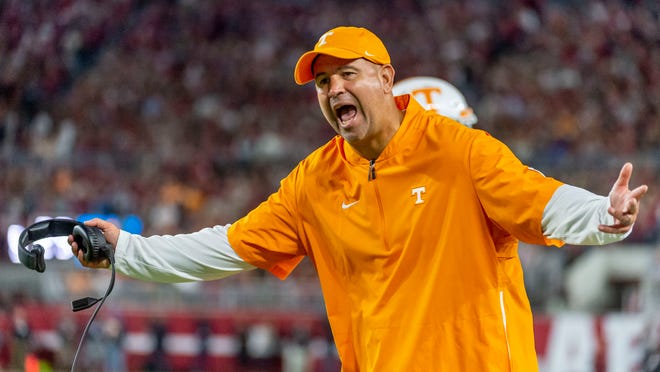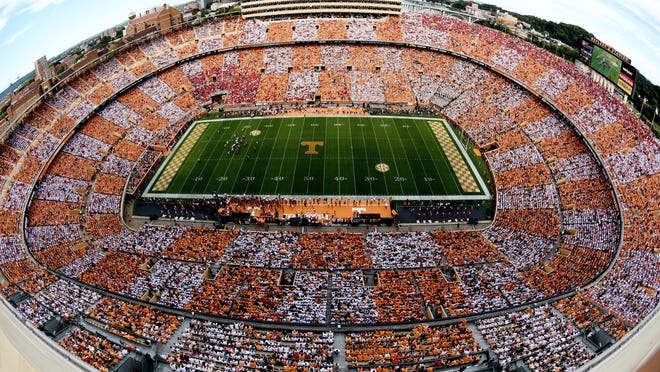
- All 18 violations are Level I, the most serious in the NCAA’s four-level infractions structure.
- Tennessee was credited for self-reporting violations and its “exemplary cooperation.”
- None of the people named in the allegations work any longer for Tennessee.
The University of Tennessee now knows exactly what it’s up against in the NCAA investigation of football recruiting violations under fired coach Jeremy Pruitt.
In a notice of allegations presented Friday to the university, the NCAA lists 18 violations and almost $60,000 of cash or gifts provided to players and their families by Pruitt, his wife, numerous coaches, recruiting staff, and at least one booster.
Knox News obtained the 51-page document Friday.
In the notice of allegations, the NCAA credited Tennessee for self-reporting violations and its “exemplary cooperation” in the investigation. It also did not find the university lacked institutional control, a significant decision that likely removes the program from program-crippling levels of punishment.
The NCAA contends Pruitt and his staff gave players cash and gifts throughout his tenure with the Vols from 2018-21. And it says that his wife, Casey Pruitt, paid more than $15,000 in rent and car payments for a Tennessee player and his mother over 2½ years.
SPORTS NEWS, DELIVERED:Sign up for our daily newsletter

All 18 violations are Level I, the most serious in the NCAA’s four-level infractions structure.
They include infractions allegedly committed by Jeremy and Casey Pruitt; assistant coaches Derrick Ansley, Shelton Felton, and Brian Niedermeyer; and recruiting staff members Drew Hughes, Bethany Gunn, and Chantryce Boone.
None of the people named in the allegations work any longer for Tennessee. They were either fired or left on their own after the university began its own investigation in November 2020. Tennessee ultimately fired Pruitt for cause, an unusual move at the highest level of college athletics, and a decision that could be a major factor in limiting the punishment for the football program.
The NCAA goes out of its way to praise the way university leaders have handled the scandal, saying “the actions taken by the institution during the investigation should be the standard for any institutional inquiries into potential violations.”
The report lists 32 instances of recruits or players taking cash or gifts, but because the names have been redacted it’s impossible to tell how many individual players the NCAA identified because some could have been involved in multiple violations.
Now comes the penalty phase of the case.
Tennessee and the people named have 90 days to respond to the notice of allegations. Then the NCAA enforcement staff has 60 days to reply to those responses.
Could Tennessee’s cooperation mean lighter penalties?
The document reflects the serious tone introduced by UT Chancellor Donde Plowman in January 2021. That’s when she fired Pruitt for cause, along with two assistant coaches and seven staff members, and announced that a university investigation had revealed evidence of sweeping and serious NCAA violations occurring under Pruitt’s watch.
“In every step of this process, the university’s quick and decisive actions have exemplified the longstanding values of the NCAA that are reiterated in the membership’s new constitution,” a university statement said.
“While NCAA bylaws prohibit the university from publicly commenting about the specific allegations, the university has and will continue to seek a resolution of this case that is consistent with the NCAA’s new constitution and in the best interests of the University of Tennessee.
In January, the NCAA ratified a new constitution that calls for individuals to be punished rather than “student-athletes innocent of the infractions,” and for postseason bans to be rarely implemented as penalties.
Tennessee did not self-impose a bowl ban because it does not want to punish players for the actions of coaches and staff no longer in the program, though sources close to the situation told Knox News that Tennessee self-imposed restrictions last year on recruiting and scholarships without making a public announcement.
Here are the 18 violations listed in the notice of allegations:
Violation 1
From late July to mid-November 2020, six recruits made unofficial visits to campus and accepted cash or gifts during recruiting dead periods amid the COVID-19 pandemic. None of those recruits enrolled at Tennessee.
Coaches Jeremy Pruitt, Ansley, Felton, and Niedermeyer and recruiters Gunn, Boone, and an unnamed student assistant arranged or provided $12,173 in hotel stays, meals, entertainment, transportation, and team apparel.
Also, Casey Pruitt arranged for a real estate agent to meet with a recruit’s family.
Violation 2
Jeremy Pruitt, Gunn, Boone, and an unnamed booster arranged or provided a player $12,707 in hotel stays, meals, airfare and other transportation, game day parking, furniture, and household items from October 2018 to December 2020.
That included Jeremy Pruitt paying $3,000 in cash to the player’s mother to assist in paying a debt for a medical bill. The gifts began when Tennessee was recruiting the prospect and continued after he enrolled and played for the Vols.
Violation 3
Casey Pruitt provided $12,500 in cash car payments – 25 payments of $500 each – and $3,000 in cash rent payments for a player and his mother from September 2018 to March 2021. The gifts began during the prospect’s recruitment and continued after he enrolled and played for the Vols.
That represented most of the $23,260 in impermissible inducements given to the player by Jeremy and Casey Pruitt, Felton, Niedermeyer, and Gunn. The remainder included hotel stays, meals, entertainment, team apparel, and game day parking.
Notably, Casey Pruitt worked in Florida State’s NCAA compliance office in 2013 when she met Jeremy Pruitt, then the Seminoles’ defensive coordinator. She was tasked with verifying players’ eligibility and ensuring the athletics department followed NCAA rules. She also worked in Troy University’s compliance office.
Violation 4
Gunn and Hughes provided or arranged $1,983 to a recruit and his family from November 2018 to December 2019, including hotel stays, game day parking, and team apparel. The recruit subsequently enrolled at Tennessee and played for the Vols.
Violation 5
Niedermeyer and Gunn arranged or provided $2,463 to a recruit and his family from January to December 2019, including cash, hotel stays, entertainment, transportation, and team apparel.

Niedermeyer also paid the recruit $750 cash at his high school, provided more gifts during an unofficial visit, and accompanied the recruit and his family on a flight to Knoxville for an official visit. The recruit did not enroll at Tennessee.
Violations 6 and 7
Gunn arranged or provided a combined $1,755 to two recruits and their families, including hotel stays, meals, and game day parking. Both recruits enrolled at Tennessee and played for the Vols.
Violation 8
From January 2019 to November 2020, coaches and staffers provided $3,919 to 13 recruits and their families in cash, hotel stays, meals, entertainment, transportation, and team apparel. Nine of the recruits enrolled at Tennessee, including six who played in games for the Vols.
Jeremy Pruitt, Felton, Ansley, Gunn, Boone, and Hughes arranged or provided the benefits. Coaches also made impermissible contact with one of the recruits during the COVID-19 recruiting dead period.
Violation 9
At least seven Tennessee football players were given $1,338 in cash from April to November 2020 for living expenses and other costs accrued from hosting prospects for impermissible recruiting visits during the COVID-19 dead period.
Jeremy Pruitt, Niedermeyer, Gunn, Boone and an unnamed student recruiting assistant arranged or provided the payments. Four of the players played in games for the Vols.
Violations 10-16
Jeremy Pruitt, Felton, Niedermeyer, Gunn, Boone, Hughes, and an unnamed student recruiting assistant were each assigned a Level I violation for unethical conduct.
The investigation determined they knowingly provided impermissible inducements to recruits, provided false information to investigators, and influenced others to do so.
Violation 17
The investigation determined that Jeremy Pruitt committed a violation involving head coach responsibility because he failed to promote an atmosphere of compliance in the football program and monitor staff from September 2018 to January 2021.
That period spanned all but the first eight months of his tenure.
Violation 18
The investigation determined the university failed to monitor the football program’s recruiting plans to ensure the staff followed NCAA rules during Jeremy Pruitt’s tenure. However, the university was not found to have committed the worse violation of lack of institutional control.
Cost of the case so far
Tennessee paid $1.12 million in legal fees to the firm Bond, Schoeneck & King from November 2020 to February 2022 to work on the NCAA case, according to invoices the university provided to Knox News after a public records request. The most recent fees, which are billed quarterly, are not yet available.
It still pales in comparison to the $12.6 million buyout the university declined to pay Pruitt when he was fired for cause over the allegations.
Reach Adam Sparks at [email protected] and on Twitter @AdamSparks.





